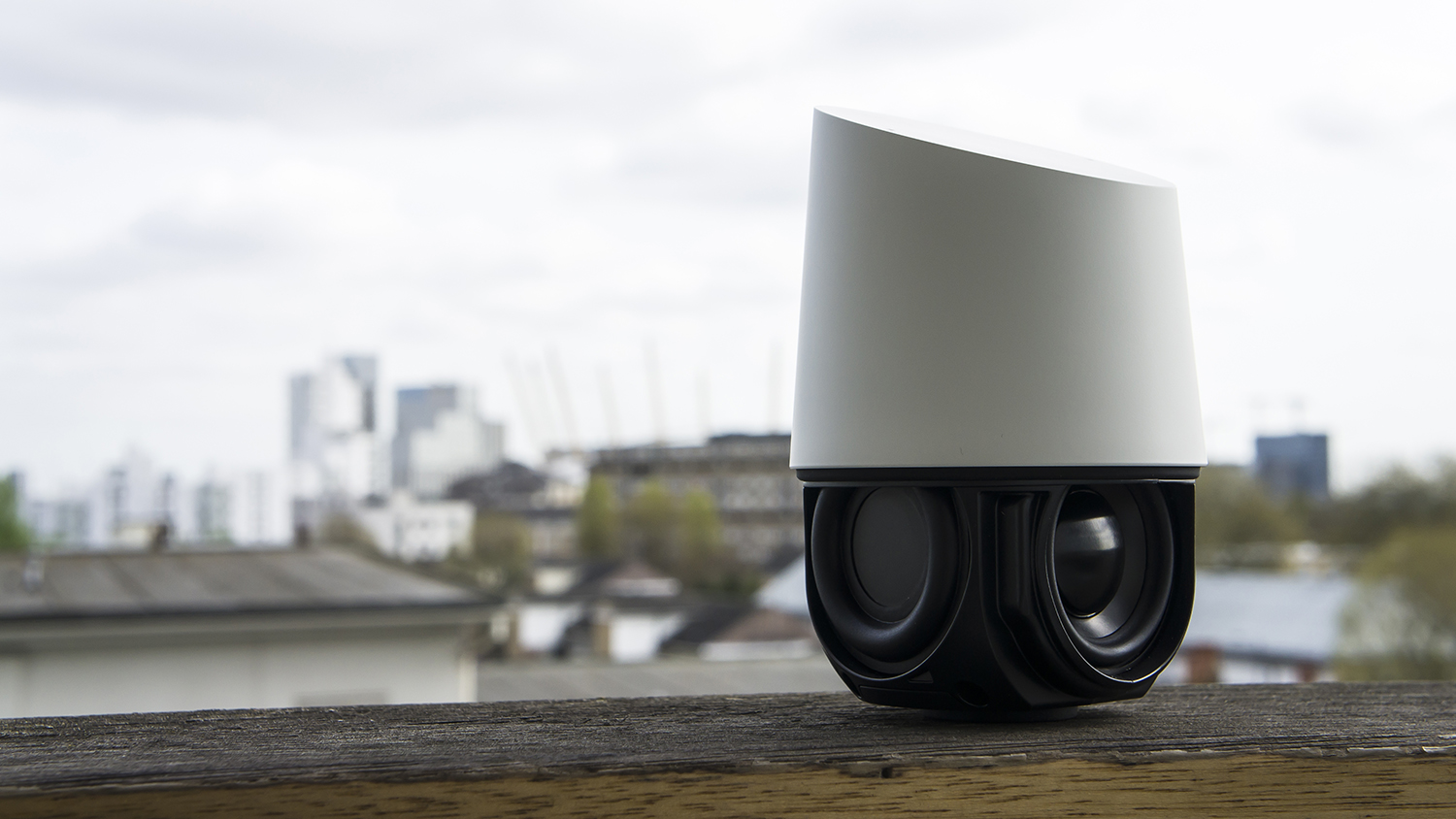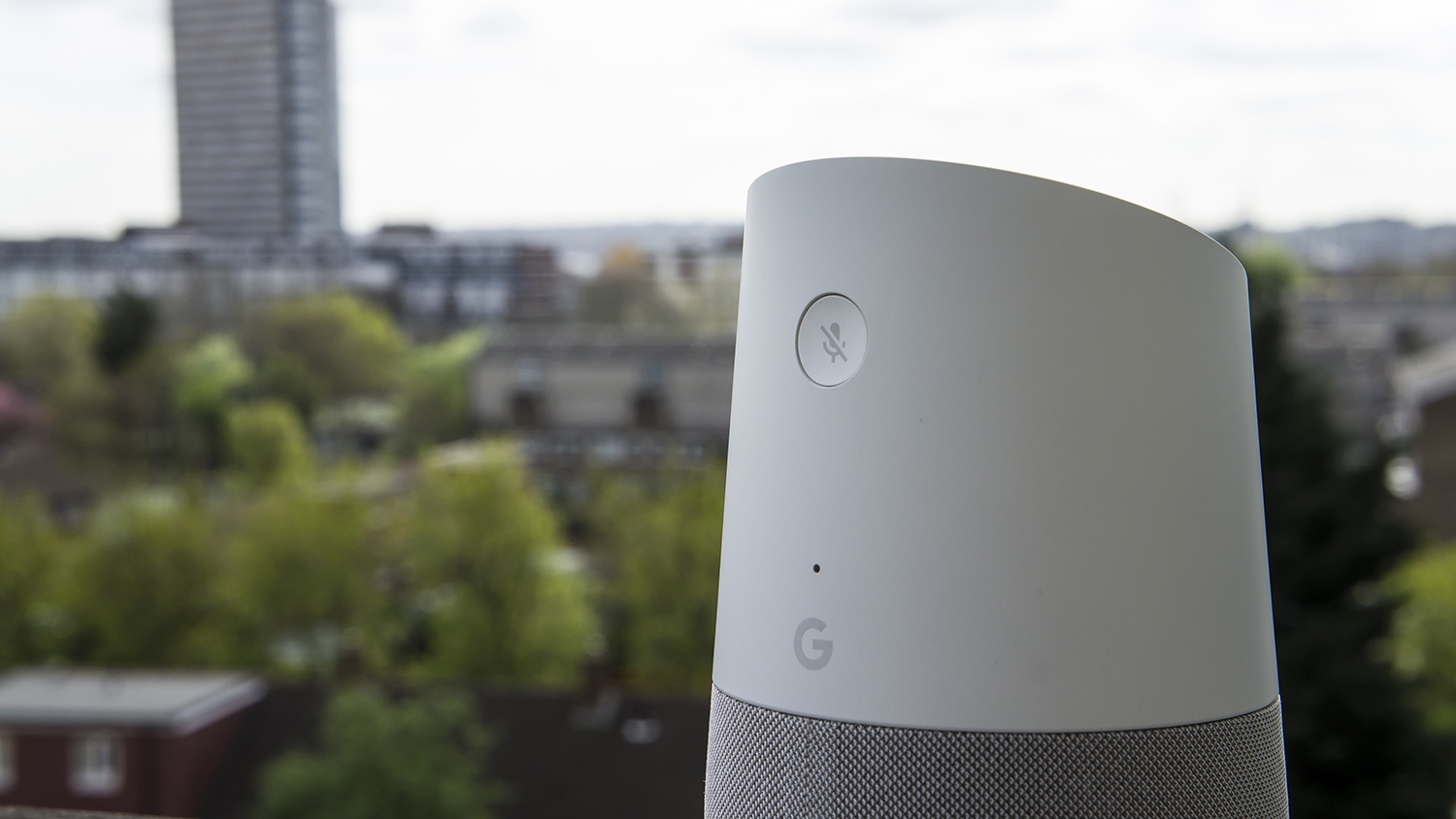Google Home review: now with multi-user support
Google's AI helper gets even more tempting
Google Home is pretty much neck and neck with it's biggest rival, the Amazon Echo. That doesn't mean it's not an excellent product, though - especially for those who have already bought into Google's ecosystem.
-
+
Cheaper than the Echo; Chromecast support; Easy to use
-
-
Voice recognition and speech capabilities are slightly lacking

Google apps integration
Because it uses Google's exemplary search algorithms - as opposed to the Echo, which relies on Bing - Google Home's search functionality is excellent. It can also handle contextual questions, meaning you can string related queries together.
Ask it for the nearest pizza place, for example, and it will give you a list of nearby restaurants. If you say "what time is the first one open until?" it will understand what you mean and answer appropriately. Follow up with "what's the phone number?" and it will read it out with no issues.
As expected, it integrates with Google's other apps, including Google Calendar, Google Keep and Gmail, which mean you can manage your calendar, check and update your shopping list and check any flight times stored in your inbox respectively. Sadly, it doesn't allow you to add new reminders to your calendar, but otherwise it's very well-rounded.

One of Google Home's real headline features, and the thing that primarily sets it apart from the Echo, is that you can use it to control your Chromecast devices. You can use voice commands to cast content to your Chromecast or Chromecast audio, fast-forward or rewind by specific increments and play and pause at will.
This is an excellent feature, and one that's smooth and intuitive to control. This already-impressive functionality has been made even more essential since Google expanded its capability, allowing Google Home to cast relevant data to your Chromecast based on queries. Ask it about your calendar, for example, and Google Home will flash up your schedule on your TV.
The list of supported streaming services has been beefed up substantially too; Deezer, Soundcloud and the free tier of Spotify have been added for audio, and a laundry list of video services like Hulu and HBO Go have also been confirmed. However, we don't yet know whether or not any of these will be supported in the UK.
Google Assistant
The inarguable centerpiece of any smart home hub is the AI brain that powers it. In the case of Google Home, that's the Google Assistant - the company's answer to Alexa, Amazon's cloud-powered digital assistant. It's effectively the same version found in phones like the Google Pixel, LG G6 and OnePlus 3T, but, in a lot of ways, the Assistant just isn't as good as Alexa.
Sign up today and you will receive a free copy of our Future Focus 2025 report - the leading guidance on AI, cybersecurity and other IT challenges as per 700+ senior executives
For a start, the speech is much more stilted; while Alexa's responses are all smooth, measured and natural-sounding, the Google Assistant has speech patterns more akin to Microsoft Sam, with jarring changes in inflection and tone.
It's also not as good at speech recognition either. While the far-field microphones picked up our commands with few problems, it quite often had trouble correctly hearing and understanding them. It's not common enough to be an issue, but it's an annoyance that we could really do without.
Audio quality
One of the primary functions of any connected speaker is going to be playing music, and Google Home performs well in this respect. It can pump out a surprising amount of volume considering its compact frame, and the the tone and audio quality is generally good. The only slight quibble we had was that the bass tended to be somewhat overpowering, occasionally drowning out the higher ranges.
Privacy
Google is one of the most notoriously data-hungry companies in the world, and frequently finds itself accused of breaching its users privacy. In order to allay any fears consumers might have about placing a constantly-connected microphone in their own home, the company has built a number of privacy measures into its AI hub, similar to the protections found in the Amazon Echo.

The first of these is the fact that Google claims that the Home unit will only start listening once it detects the 'OK, Google' command, rather than constantly recording. For the truly paranoid, Google has included a mute button, which completely shuts off the microphone, including stopping it from listening for the wake command. Google keeps a record of what you've said to your assistant, but you've always got the ability to delete specific entries, or scrub it entirely.
You can also choose whether or not to grant it access to details of your Google account, like your calendar and emails. If you're considering getting Google's digital hub at all, however, chances are you're not too fussed about the company's data-gathering.
Verdict
If you're looking for a smart home hub and haven't yet invested in one of the Echo devices, there's really not much to choose between Google Home and Amazon's offering. Their range of features and functionalities is all but identical, save for a few key differences.
Google Home's integration with the rest of the company's products, apps and services is excellent, it's got slicker controls and a nicer design, and it's even 20 cheaper. However, the Echo has a better speech and language engine, more third-party integrations and (to our ears) more enjoyable audio quality.
Whether you prefer the Echo or the Home is likely going to come down to how much you value these individual strengths - audiovisual fanatics will like Google Home's compatibility with Chromecast devices, while the Echo's e-commerce chops will be best-suited to those who do a lot of online shopping through Amazon's various platforms.
Google Home is a superb AI hub. It's an excellent example of how voice-controlled AIs can simplify your digital world. And, while it's not going to immediately change your life, over time it's likely to make a big difference to your productivity and daily routine.
Verdict
Google Home is pretty much neck and neck with it's biggest rival, the Amazon Echo. That doesn't mean it's not an excellent product, though - especially for those who have already bought into Google's ecosystem.
Adam Shepherd has been a technology journalist since 2015, covering everything from cloud storage and security, to smartphones and servers. Over the course of his career, he’s seen the spread of 5G, the growing ubiquity of wireless devices, and the start of the connected revolution. He’s also been to more trade shows and technology conferences than he cares to count.
Adam is an avid follower of the latest hardware innovations, and he is never happier than when tinkering with complex network configurations, or exploring a new Linux distro. He was also previously a co-host on the ITPro Podcast, where he was often found ranting about his love of strange gadgets, his disdain for Windows Mobile, and everything in between.
You can find Adam tweeting about enterprise technology (or more often bad jokes) @AdamShepherUK.
-
 Hacker offering US engineering firm data online after alleged breach
Hacker offering US engineering firm data online after alleged breachNews Data relating to Tampa Electric Company, Duke Energy Florida, and American Electric Power was allegedly stolen
By Emma Woollacott Published
-
 Infosys teams up with AWS to fuse Amazon Q Developer with internal tools
Infosys teams up with AWS to fuse Amazon Q Developer with internal toolsNews Combining Infosys Topaz and Amazon Q Developer will enhance the company's internal operations and drive innovation for customers
By Emma Woollacott Published
-
 Lisa Su says AI is changing AMD’s hiring strategy – but not for the reason you might think
Lisa Su says AI is changing AMD’s hiring strategy – but not for the reason you might thinkNews AMD CEO Lisa Su has revealed AI is directly influencing recruitment practices at the chip maker but, unlike some tech firms, it’s led to increased headcount.
By Ross Kelly Published
